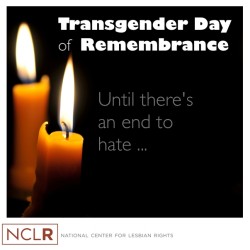Today, International Transgender Day of Remembrance is being observed worldwide. It is day to honor the memory of transgender people we have lost to senseless acts of hatred and violence and to reflect on the transgender community’s incredible strength and resilience.
Both globally and in the United States, transgender people—and transgender women of color in particular—are assaulted and often murdered with impunity, simply because of who they are. In most cases, these crimes are not investigated and the perpetrators are never prosecuted or brought to justice. In many countries, it is the police who engage in the most vicious violence against trans people, and trans individuals who are targeted by violence at the hands of private actors are afraid to report the crimes to the police for fear of being re-victimized or even silenced forever.
In the U.S., while some police departments have taken significant steps to train their officers and work closely with the trans community, most have not. Trans people in the U.S. are also often afraid to report hate crimes to the police, and many transgender women of color report being harassed and profiled as sex workers by police simply for “walking while trans.”
In the past few months alone, nearly a dozen trans women have been brutally attacked or murdered in the U.S., including the unsolved murder of six trans women of color in Baltimore, Maryland, the unsolved murder of a 24 year old trans women of color in Nashville just last week, and the alleged murder of a Filipina trans woman by a U.S. marine last month. This epidemic of violence shows how urgently we must work both to demand accountability for these crimes and to change the legal and social culture that devalues and demeans transgender people and sends the message that their lives are expendable.
In the face of this relentless violence, transgender people have shown strength, determination, and perseverance.
Andrea Jenkins, a transgender playwright, artist, poet, and tireless social activist, has described the contrast between the growing visibility of trans people in the media and popular culture and the continued exploitation and degradation of many trans women of color on the streets:
“The tables are rapidly turning, attention is being payed, Time Magazine put a Transwoman of color on the cover and said The Transgender Movement was at the ‘Tipping Point: America’s Next Civil Rights Frontier,’ and while that’s true, 18 Trans women of color will likely be arrested tonight, processed and locked up with the male population or placed in solitary for their own protection, becoming more victims to the prison industrial complex that thrives on poor, black bodies, to fuel the monetization of black labor,for corporate interests, how does she get through this madness?
She remembers those 18 hours of hunger, those 18 years of struggle, the 18 Trans sista’s showing each other love, she remembers the 18 hours strolling around Bangkok, the 18 times she purged, and the 18 lives honored on TDOR, the 18 different places where she’s shared their story of brilliance, resilience and beauty.”
Even as we celebrate the resilience and strength of the trans community, the Transgender Day of Remembrance calls on us to recognize this stark dissonance and to do more. Trans people cannot fight this battle alone. It is time—and past time—that our movement prioritize the crisis of violence against trans people as our most pressing issue and insist that we will not rest until trans people are treated with full equality, dignity, and respect.










